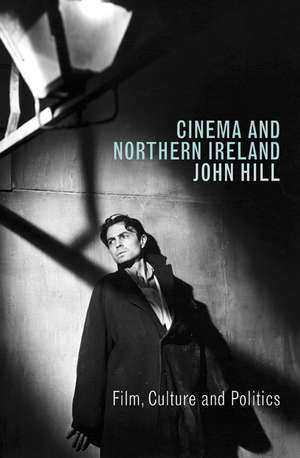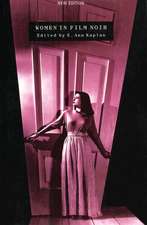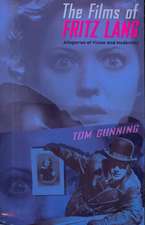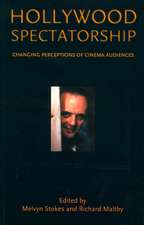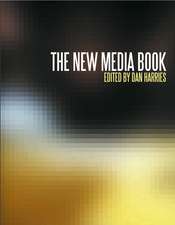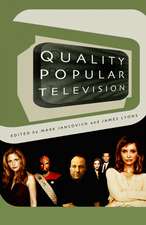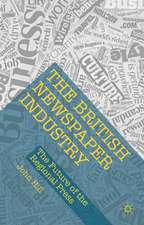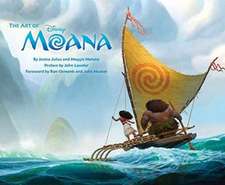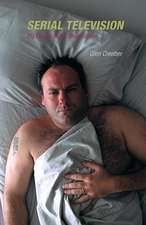Cinema and Northern Ireland: Film, Culture and Politics
Autor John Hillen Limba Engleză Paperback – 6 aug 2006
Preț: 254.88 lei
Nou
Puncte Express: 382
Preț estimativ în valută:
48.77€ • 50.92$ • 40.27£
48.77€ • 50.92$ • 40.27£
Carte disponibilă
Livrare economică 25 martie-08 aprilie
Preluare comenzi: 021 569.72.76
Specificații
ISBN-13: 9781844571345
ISBN-10: 1844571343
Pagini: 262
Dimensiuni: 155 x 235 x 18 mm
Greutate: 0.56 kg
Ediția:2006
Editura: British Film Institute
Colecția British Film Institute
Locul publicării:London, United Kingdom
ISBN-10: 1844571343
Pagini: 262
Dimensiuni: 155 x 235 x 18 mm
Greutate: 0.56 kg
Ediția:2006
Editura: British Film Institute
Colecția British Film Institute
Locul publicării:London, United Kingdom
Notă biografică
John
Hill
is
Professor
and
Head
of
Research
in
the
Department
of
Media
Arts
at
Royal
Holloway,
University
of
London.
He
is
the
author
and
editor
of
a
number
of
books,
including
Cinema
and
Ireland
(1987);
Border
Crossing:
Film
in
Ireland,
Britain
and
Europe
(1994);
The
Oxford
Guide
to
Film
Studies
(1998);
British
Cinema
in
the
1980s
(1999)
and
National
Cinema
and
Beyond
(2004).
Textul de pe ultima copertă
John
Hill's
groundbreaking
study
is
the
first
book
to
focus
solely
on
the
cinema
from
and
about
Northern
Ireland.
Hill's
comprehensive
account,
based
on
detailed
archival
research,
traces
the
history
of
film
production
in
Northern
Ireland
from
the
beginnings
of
a
local
film
industry
in
the
1920s
and
1930s,
when
the
first
Northern
Irish
'quota
quickies'
were
made,
through
the
propaganda
films
of
the
1940s
and
1950s
and
on
to
the
cinema
of
the
'Troubles'.
Hill
carefully
examines
the
relationship
between
films
and
the
political
tensions
within
Northern
Ireland,
identifying
the
ways
in
which
films
have
both
reinforced
and
challenged
social
divisions.
He
considers
the
moral
and
religious
controversies
that
have
surrounded
cinema
in
the
North
and
describes
the
political
censorship
of
films
held
to
be
seditious
such
as
"Ourselves
Alone"
and
"The
Plough
and
the
Stars".
He
assesses
the
role
of
filmmaking
in
Northern
Ireland
during
and
after
the
Second
World
War
and
considers
how
Northern
Ireland's
relationship
with
Britain
and
the
rest
of
Ireland
figured
in
feature
films
such
as
"Odd
Man
Out",
as
well
as
in
government
propaganda
films
and
informational
shorts.
He
also
traces
the
controversies
surrounding
the
history
of
government
policy
in
Northern
Ireland
and
assesses
the
cultural
and
industrial
impact
this
has
had
on
local
film.
He
then
turns
his
attention
to
how
the
cinema
has
represented
the
Troubles.
Tracing
the
history
of
Troubles
cinema
as
it
proceeds
through
the
height
of
the
conflict
and
into
the
'peace
process',
Hill
provides
a
fresh
perspective
on
a
variety
of
films,
ranging
from
"Resurrection
Man"
and
"The
Boxer
to
Divorcing
Jack"
and
"Mad
about
Mambo".
Both
original
and
authoritative,
"Cinema
and
Northern
Ireland"
is
destined
to
become
the
standard
work
on
the
subject.
